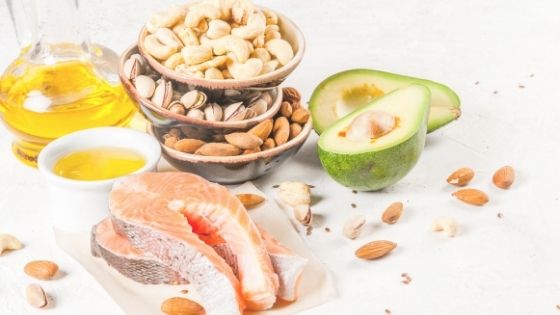How Much Fat Per Day? Myths of Weight Loss Diet Plans!

How much fat per day do you need? Unfortunately, you're not sure how much fat you should be eating each day, and it's hard to figure out what a healthy diet looks like.
Most of the nutrition advice is confusing or contradictory, plus there are so many fad diets that it can seem impossible to know which one is right for you.
Build Your Body has created an easy-to-follow guide that will help you achieve your goals by teaching you exactly how much fat per day to eat.
Our guide considers your age, height, weight, and activity level to give personalized recommendations about what kind of fats are best for you based on science.
How much fat per day do you need?
A person should consume between 20% and 30% of their total calories as fat per day. For an adult who needs 2,000 Calories per day, they must eat at least 44-76 grams of fat or oils each day.
In the case of a child that requires 1,200 Calories, 26 - 40 grams of fat per day to maintain healthy levels to meet the recommended amounts by nutritionists who advise one-third from each type (avoiding trans fats).
What fats do I have to eat?

Three types of fat that we should include in our diet are:
Saturated fats
Saturated fats are found in animal products like meats and dairy and some plant-based oils. They are solid at room temperature and are typically high in cholesterol.
In this type of fat, you can find super-saturated fats. These are found primarily in tropical plants such as coconut oil and palm kernel oil.
They are liquid at room temperature and contain the same heart-healthy benefits as polyunsaturated fats.
Mono-unsaturated fats
Mono-unsaturated fats are found in plant-based oils such as olive oil, corn oil, and canola oil. They are liquid at room temperature and primarily comprised of unsaturated fats.
The benefits of monounsaturated fats help reduce cholesterol levels in your body. In addition, they contain high amounts of Omega 3, which allows them to:
- Improve heart health.
- Lose weight.
- Improve brain function.
- Improve memory.
Polyunsaturated fats
You can find polyunsaturated fats in high amounts in vegetable oils such as soybean, walnut, sunflower, and safflower oils. They also contain a small amount of monounsaturated fat. Polyunsaturated fats are liquid at room temperature and contain omega-3 fatty acids which may reduce the risk of cardiovascular disease."
Suppose you want to achieve these health benefits. In that case, it's essential to distribute those percentages evenly among omega3s found in plant foods such as walnuts and flax seeds and animal meats like salmon and eggs without consuming trans-fatty acids such as vegetables shortening because this has been.
Benefits of consuming healthy fats
That is why we need to know the benefits of consuming fats:
- They provide essential fatty acids necessary for developing cell membranes and the brain.
- They provide fat-soluble vitamins such as A, E, D, and K.
- Fats help in the formation of eicosanoids, hormones that influence circulation.
- They contribute to thermogenesis, warming the body.
- They bring a lot of energy to the body. For example, 1 gram of fat is equivalent to 9 calories.
How much fat do you need?
The fat your body needs depends on your physical activity, weight, and age.
1. Your activity
The more active you are, the more body fat you will burn. If not enough body fat is burned, your system will use your dietary fat as a backup energy source. As a result, your need for dietary fat (and therefore total calorie intake) will be lower than otherwise.
For example, suppose you have a sedentary lifestyle. In that case, you may need 2.5g fat per kg body weight, if you are moderately active, you may need 1.7g fat per kg body weight, and if you burn lots of energy, you only need 1.2g fat per kg bodyweight daily to fulfill your nutrition needs.
The old rule is that you should consume 1/3 of your total calorie intake in the form of fat. However, it has proven to be a rough estimation, you may need slightly more or less depending on your activity level, and you should still at least meet this minimum.
2. Your weight
If your BMI (body-mass index) is above 25, you have a high risk of health problems related to excess fat. Your need for dietary fat will be less than otherwise but still significant. If your BMI is above 30, a healthy diet should include no more than 30% energy from fat, and you should carry out physical activity regularly.
For example, you may need 1.7g fat per kg body weight if you weigh 80kg and are moderately active, or you may only need 0.9g fat per kg bodyweight daily to meet your nutrition needs if you weigh 180kg. That is because you carry out physical activity regularly.
3. Your age
The larger your obesity, the more critical it is for you to control fat intake to decrease your risk of developing type 2 diabetes and heart disease. But even if you are very slim, a healthy diet should include no more than 35% energy from fat, and you should carry out physical activity regularly.
If your BMI is 20-25, the total fat intake can be between 25-40% of energy from fat. If your BMI is below 20, fat intake should not exceed 30% of energy from fat.
Why are trans fats bad for you?
Trans fat is the worst type of dietary fat you can eat. Unlike other classes, trans-fatty acids raise your bad cholesterol and lower your good cholesterol levels in just a few days or weeks. Overeating over time will increase the risk for heart disease, which kills more adults than any other cause every year.
Avoid trans fats because they raise LDL cholesterol levels, leading to an increased risk for cardiovascular disease. Trans fats can be found primarily on commercially baked goods, refined oils, and processed food products, which often come from animals or plants that were chemically altered or hydrogenated.
The problem is that too we consume much-saturated fat and trans fats from processed meats. There's also a high intake of polyunsaturated fats, present in vegetable oils (except olive oil) and fried foods. Added to this is the amount of unhealthy margarine or cookies with added transfats!
Health risks of trans fats
Consuming too many trans fats increases your risk of developing health problems, including:
Heart disease
Trans fats are bad for you because they can cause a heart attack. That is because trans fat raises your "bad" LDL cholesterol, which clogs your arteries. Trans fat also reduces your "good" HDL cholesterol, cleansing your streets.
The Food and Drug Administration (FDA) has guidelines to help Americans find the number of trans fats in food products. The FDA recommends you eat as little trans fats as you can.
Obesity and diabetes
Trans fats are also thought to have a lot to do with the growing rate of obesity and diabetes in America. However, studies show that another type of fat you eat, called saturated fat or "bad" fat, can be suitable if you replace trans fats.
Cancer
Trans fats may also increase your risk of cancer. Some studies have found that people who eat a lot of trans fat in their diet are two times more likely to get cancer than those who avoid it, although the link has not been proven yet.
Alzheimer's disease
Scientific studies show that eating a diet high in trans fats may increase your risk of developing Alzheimer's disease.
They interfere with the absorption of essential nutrients
A diet high in trans fat may also interfere with the absorption of essential nutrients like vitamins E and K and minerals like calcium and zinc. We cannot remove fat consumption is still fundamental to our body's functioning and should be considered a necessary ingredient for life.
Lowered immune system
The "bad" fat you eat may also lower your body's immune response, making you more likely to get sick and stay sick. Trans fats easily damage cell membranes and reduce the amount of infection-fighting cells in your blood that help fight off bacteria or viruses before they make you sick.
In addition to all that, you may notice other symptoms of overeating trans fats, such as:
- Being tired or having problems paying attention or concentrating
- Not feeling hungry (so you don't eat as much)
- Getting headaches or stomachaches
It is important to remember that you can reduce your risk of developing these health problems by simply decreasing the number of trans fats you eat.
Despite knowing this information, most people often come up with excuses for why they can't consume fats in their diet. However, the reality is that without them, your body will not function properly.
Recommendations when consuming fats
The first recommendation is moderation in the intake of this type of food. We should avoid trans fats and reduce the consumption of processed foods (such as viennoiseries, pates, sausages) and fried foods to limit saturated fat intake.
On the other hand, we recommend using olive or coconut oil and monounsaturated fats. This fat contains many antioxidants and phytosterols, substances that block the entry of cholesterol into our bodies. Also, a diet abundant in vegetables like avocados protects against cholesterol buildup.
Also, dairy products. The best thing about dairy products is that they contain a "neutral" saturated fat and aren't as bad for you as they were once thought.
And most importantly, one must increase their intake of omega-3s found in fatty fish like salmon, trout, tuna, or sardines. These fats are good for your health and should be eaten two times per week at the very least!
Conclusion
Do I have to follow a high-fat diet? It's not as hard to figure out how much fat per day you need if you focus on the types of fats. The trick is figuring out which kind of fat your body needs more than others and going from there.
What are some facts that will help your brain function well? Omega-3s, saturated fatty acids, monounsaturated fatty acids, polyunsaturated fatty acids, linoleic acid (omega-6).
If we consider these along with trans and monounsaturated fats, it becomes easier to calculate what kind of diet might work best for you based on the amount of each type of fat in your daily intake. (Trusted Sources 1*, 2*, 3*, 4*)
Medically reviewed and approved by Nataniel Josue M D.

